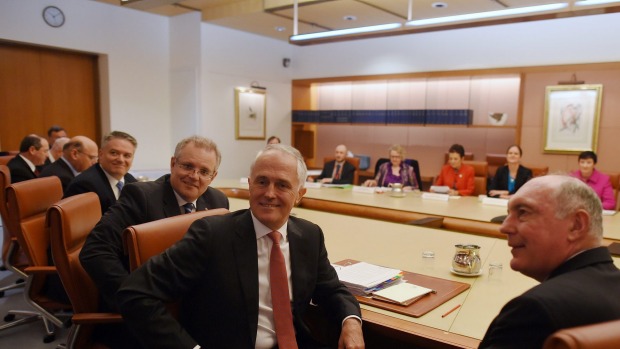The ERF will fail without tougher sanctions against pollution [6 October 2015 | Peter Boyer]
The message from Malcolm Turnbull ahead of last week’s reform summit was that nothing was off the table, so it was reasonable to expect the dominant economic issue of our time – climate change – to get a look in.

The heavyweights line up for the reform summit in Canberra on 1 October. PHOTO Australian Financial Review
We heard plenty about superannuation, business and income tax, GST and youth unemployment, but what little detail we have about the outcome suggests that climate was overlooked.
It was an opportunity missed. The summit could have put broad-based carbon pricing back at the top of the economic agenda, where virtually all expert opinion including the Organisation for Economic Cooperation and Development says it belongs.
In Hobart last week the head of the OECD environment directorate added his voice in support of a strong national carbon pricing mechanism. Nils Axel Braathen was brought here by the Economic Society of Australia and the University of Tasmania’s Institute for the Study of Social Change.
In 2012-13 the OECD, using methodology developed by Australia’s Productivity Commission, made an intensive multi-national study of all the commonly used emission abatement measures. It came down firmly on the side of economy-wide carbon pricing schemes.
Braathen told his Hobart audience that the study had found feed-in tariffs, subsidies to renewables, certificate trading and other sector-specific strategies to be very costly per tonne of carbon dioxide abated compared to a broad-based tax or an emissions trading scheme.
As a rule of thumb, he said, “it’s carbon taxes or emissions trading first, and daylight second”, with other measures having only peripheral value by comparison. As the OECD report said, the huge scale of the global climate challenge dictates that lowest-cost options must always be favoured.
So where does this leave the Turnbull government, inheritors of Tony Abbott’s Direct Action climate policy and its centrepiece, the $2.55 billion Emissions Reduction Fund?
Despite Abbott’s firm and repeated declaration that any kind of carbon pricing was off-limits, environment minister Greg Hunt based his claim of “spectacular” success for the first ERF auction in April on the average amount committed per tonne of carbon saved, $13.95.
So on Hunt’s own admission the ERF does involve a carbon price, albeit without the former prime minister realising it. The question remaining is whether the scheme will be effective over the long-term in forcing emissions down.
A big majority of economists believes that in its current form the ERF can’t meet higher carbon costs without greatly exceeding its long-term budget cap of $200 million a year, something treasurer Scott Morrison definitely doesn’t need.
The present ERF can’t accommodate a rising carbon price, but a static price won’t put downward pressure on emissions. The scheme relies on business playing ball in the absence of a penalty – a bit like relying on everyone to behave in the absence of a police force.
Monash University’s Gujji Muthuswamy is one economist who thinks that the ERF already has the makings of an effective “baseline-and-credit” emissions trading scheme under which major emitters must keep their output below the government-mandated level for their particular enterprise.
Muthuswamy argues that the ERF is friendlier to business than Julia Gillard’s “cap-and-trade” scheme (the favoured European model) because businesses paid more for excessive emissions under the Labor scheme. But being business-friendly isn’t all that matters.
The government’s modest 2030 target demands not just pegging emissions at today’s level but, during a time when the economy is supposed to grow, reducing them by least 26 per cent below 2005 levels. In the OECD’s considered view, that demands an economy-wide price.
The uncomfortable truth is that if all countries meet current commitments we will still be faced with around 3.5 degrees of warming by 2100. That is well into catastrophic territory, or in bushfire parlance, Code Black. So the Paris climate summit is going to require all countries to do better.
The breezy optimism shown by Malcolm Turnbull and Greg Hunt towards the ERF as it stands is misplaced. They will have to toughen it up or stand accused of being no more serious about carbon abatement than Tony Abbott.
That would take some explaining to a tired, cynical electorate.
